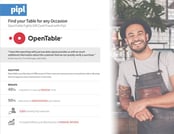Digital Trust for Ecommerce
Digital acceleration is driving an increase on online transactions and an increase in fraud. The good news is that you can reduce fraud losses and confidently approve more transactions.
Pipl sees connections that others can't. With Pipl Trust you can identify trusted customers quickly to reduce friction across the customer journey. With a simple snippet of code you can add an invisible, frictionless trust evaluation to every page or app screen. Keep consumers happy while protecting your platform. Learn about our purpose-built solutions designed to stop fraud at every stage of the consumer lifecycle.
Request a demo
Rapid Transaction Approval
- Connect rich online identity information to your transaction data for instant verification of a person's identity details and relationships.
- Visual tools reveal the connections between data elements so fraud teams can approve transactions faster and with greater confidence.
- Current and historic email addresses, mobile phones, physical addresses, and relationships are corroborated and connected for unprecedented accuracy and confident decision-making.
Account Screening
- Stop fraud before it starts. Review new account applications with a big-picture view of the person behind the account.
- Verify account information changes to detect and rule out account takeover activity.
- Validate legitimate "thin-file" customers and detect potential synthetic identities.
Account Takeover & Chargebacks
- Accurately separate legitimate account changes and chargebacks from "friendly fraud" and malicious attacks.
- Detect, and investigate suspicious activity patterns.
- Resolve investigations more quickly with real context and reliable evidence.
Open Table Fights Fraud with Pipl
How is OpenTable playing defense against the bad actors focused on exploiting their successful digital gift card program purchases without alienating their loyal customers? Download the full case study to find out how OpenTable is leveraging Pipl Search in their manual process.
